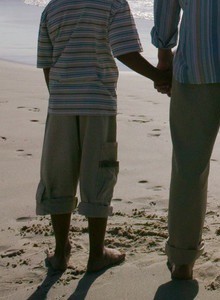Self-Injury – A Guide For Parents & Families
- What is self-injury?
- Why is my son/daughter self-injuring?
- How should I react to my son/daughter's self-injury?
- How do I know if my son/daughter is self-injuring?
- How do I talk to my son/daughter about self-injury?
- How can I help my son/daughter?
- What treatments are there for self-injury?
- Is your son/daughter a minor or an adult?
- Can my son/daughter stop self-injuring?
- Recommended Readings
Non-suicidal self-injury (NSSI) is the deliberate and direct destruction of one’s body tissue, without suicidal intent and for reasons not socially or culturally sanctioned. This definition excludes tattooing or piercing, and indirect injury such as substance abuse or eating disorders.
NSSI should also be distinguished from self-injurious behavior (SIB) that is commonly seen among individuals with intellectual and developmental disabilities (e.g., repetitive, stereotyped head banging).
Self-injury methods
The most common methods of NSSI include cutting, burning, scratching, and bruising. These injuries can range from superficial to moderate. Extreme body mutilation such as amputation is typically excluded from the definition.
Prevalence
Although any one at any age may begin to engage in NSSI, the most common age of onset for NSSI is early adolescence. Between 14 and 24% of adolescents in community samples report having engaged in NSSI at least once in their lifetime. This rate may range from 60 to 80% in clinical samples. Recent research indicates that there is little to no sex difference in prevalence of NSSI in community samples. However, NSSI is more prevalent in females in clinical samples.
Individuals who engage in NSSI may injure themselves repetitively over long periods of time, with increasing severity, and may use different methods over time. Alternatively, they may reduce their NSSI behavior before beginning again during periods of high stress.
 As noted above, one of the most common reasons for self-injuring is to cope with intense negative emotions (like sadness, stress and anger) and thoughts (such as negative thoughts about oneself). These feelings or thoughts are felt to be so intense and overwhelming that they are intolerable. People who self-injure report that following the self-injury they experience a “relief” from these negative emotions/thoughts for a short time.
As noted above, one of the most common reasons for self-injuring is to cope with intense negative emotions (like sadness, stress and anger) and thoughts (such as negative thoughts about oneself). These feelings or thoughts are felt to be so intense and overwhelming that they are intolerable. People who self-injure report that following the self-injury they experience a “relief” from these negative emotions/thoughts for a short time.
Sometimes people self-injure to punish themselves for things they feel guilty about, or when they are really hard on themselves and feel they have not done well enough.
Some people self-injure to reconnect with themselves and others (that is, to feel something, even if it is pain). Some people use self-injury as a way to tell others about how they feel.
There are many other reasons for self-injuring and someone may self-injure for more than just one reason or the reason for the self-injury may change over time as the self-injury continues. As anyone who self-injures will tell you, it is very hard to say “why” they self-injure, it is a complex combination of things- however they do know that they are doing this to try to feel better in one way or another.
Self-injury as unhealthy coping
People who self-injure often have a hard time dealing with their feelings. Instead of being able to cope with an intense emotion (such as sadness or anger), they use self-injury try to reduce, manage, or escape from these feelings. Because for some people the self-injury brings relief, it is tempting to keep using it to cope with these difficult feelings, however, the more often a person uses self-injury to cope, the more likely they are to self-injure when they have difficult feelings in the future. Many people who self-injure report feeling that they “can’t stop” or that they “are addicted” to self-injury. It is important to break the cycle early on as it becomes increasingly difficult to stop.
As a parent of a son/daughter who is self-injuring it can feel almost impossible to understand how your child might feel the self-injury “helps”.
As parents we have a hard time hearing this but it is important to understand that people who self-injure DO feel a sense of relief following the self-injury (although only for a short time after which they often feel worse) and this contributes to the desire to do it again.
Self-injury and suicide
Self-injury is NOT an attempt to die. Most people who self-injure say they do it to feel better, to express their pain and/or to stop feeling numb. In fact, some people who self-injure even say they do it to stop themselves from acting on urges and thoughts to kill themselves. Although self-injury and suicide attempts are different behaviors, many individuals who self-injure also may struggle at times with suicidal feelings.
People who self-injure are at a higher risk for suicide when their distress is greater than their ability to cope. Sometimes people may self-injure as a way to cope, and to stop themselves from acting on these thoughts and urges of suicide.
In any case, because we know that those who self-injure are also at greater risk for attempting suicide at some point (even though these are different behaviors), anyone who self-injures should be evaluated for possible suicide risk.
Finding out that your son/daughter is self-injuring can be very difficult. Whether your  son/daughter is a minor (adolescent or younger) or a young adult or even an older adult it is still hard to believe or understand.
son/daughter is a minor (adolescent or younger) or a young adult or even an older adult it is still hard to believe or understand.
Common reactions include:
- Shocked and horrified (e.g., ‘how could they cut or burn themselves?’)
- Confusion and worry (e.g., ‘what is wrong with them?’ ‘are they mentally ill?’)
- Anger that they could do this, (e.g.,‘why don’t they just stop’) and even sometimes having thoughts that they are doing it to get attention or to manipulate those around them.
- Deep sadness that your son/daughter is doing this
- Guilt, wondering what you may have done to make them do this, and guilt for feeling anger about the self-injury
These are all VERY normal reactions to have.
Parents struggle in dealing with a son/daughter who self-injures, many different and confusing feelings come up and it is important to know that these are normal reactions but that to help your son-daughter some of these feelings should not be shared with him/her.
In addition to these reactions, you likely have several questions. You may be wondering about self-injury and why your son/daughter would intentionally hurt him or herself. You likely want to know what the different signs of self-injury may be and then how to talk about it with your son/daughter. You likely want to know where you can learn more about it in order to best help him/her. Below, we address these very common concerns and provide important information about self-injury and what parents can do to help their son/daughter. We have provided information that applies to all parents- parents of young children, adolescents, young adults and older adults.
Below, there are two additional sections dealing with the issues specific to “if your son/daughter is a minor” and “if your son/daughter is an adult”.
Sometimes parents are unsure if their son/daughter is self-injuring. For many people, self-injury is secretive; it is often hard for them to discuss it with anyone. At times, this secrecy may even be a signal that something is wrong – especially if this is a significant change for your son/daughter.
Another important sign to look for is a significant change in his/her mood or behavior. Communicating with your son/daughter, even if they are living away from home, checking in and talking to them about your concerns is important (and we provide a few steps on how to bring up self-injury with your son/daughter below).
Often, when people self-injure, they experience more distress and other negative moods (e.g., sadness, frustration); they also become more distant from those around them, they may withdraw from others. Also parents of youth or young adults who self-injure often report that their son/daughter never really communicated well about their feelings.
Here are a few other possible signs of self-injury that are important to be aware of:
1. Unexplained cuts, burns or bruises; these typically occur on the arms, legs and stomach.
2. Finding razors, sharps, knives or other items that may be used to self-injure.
3. Noticing that your son/daughter is spending less time with peers, with you and other family members. They may spend much more time alone.
4. Noticing that your son/daughter is wearing clothing that doesn’t quite match the weather. Since many individuals will self-injure on their arms and legs, these body parts may be covered up – even during very warm weather (e.g., wearing a long-sleeved shirt and pants on hot summer days). Wide band leather bracelets are common for young people to use to cover up cuts and scratches on the wrist.
 Here are a few things that may be helpful when talking about self-injury with your son/daughter:
Here are a few things that may be helpful when talking about self-injury with your son/daughter:
1. Choose a good time to speak with your son/daughter. It is best to talk privately in a place where you can both be comfortable and when you feel calm.
2. Be honest about your level of concern.
3. Be aware of your emotions. If you are very angry, it may not be a good time to have the conversation and you may need to take a time-out for you first. If you are having trouble staying calm, this may also be a sign that it may not be a good time to have the conversation. Having the conversation when you are calm will be important.
4. Start by telling your son/daughter why you are concerned and why you believe he/she may be injuring himself/herself.
5. Focus the conversation on your son/daughter’s feelings and behavior.
6. Do not lecture, accuse, or threaten (e.g., with ultimatums) your teen.
7. Ask open-ended questions using a supportive and calm tone. Work with your son/daughter to understand what he or she is going through.
8. Reassure your teen that he/she will not be punished for self-injury.
9. If your son/daughter is receptive to the conversation, ask questions about self-injury (e.g., how long he/she has been doing it, how often, where the self-injury occurs and why it is done, including how it makes them feel). This can help you to better understand what your son/daughter is experiencing and may be helpful in determining where to go for help.
10. It is important to then get professional help. You can talk to your family doctor, or a mental health professional like a clinical psychologist. Getting professional help will be very important. You can’t treat self-injury yourself.
If your son/daughter refuses to talk about it, that’s okay. It can be difficult for them to talk about it at first. Repeat your concerns and tell him/her that you will try to have the conversation again later. When you do, try to follow these approaches in the next conversation.
1. DO NOT ignore the problem. Self-injury is most often a sign of distress and may indicate mental health difficulties. Although it is tempting to see it as a “fad” or “stage” it is not in your son/daughter’s best interests to do so.
2. Remember that you want to build trust with your son/daughter during initial conversations. You and your family can play an important role in supporting your son/daughter as he/she works to learn healthier ways to cope.
3. Listen to what your son/daughter says and how they feel. As parents we find listening to our children’s pain difficult so we try to problem solve or suggest a more positive viewpoint. This can feel like “not listening” to our children. We need to listen WITHOUT trying to correct, problem solve or suggest, just confirming with them what we are hearing.
4. If your son/daughter is at immediate risk of any potentially life threatening behavior (i.e., suicidal thoughts or actions) take him/her to the hospital. This is true whether your son/daughter is a minor or whether they are an adult. When someone is at risk of a life threatening action those around them are obliged to take them to the hospital for evaluation. If they refuse to go you can and should call the police to help you manage. This is in the situation where you believe they may do something life threatening to themselves or others.
5. If there is no immediate risk, you can talk to your son/daughter before taking them to see a doctor, psychologist, or mental health worker (if they are a minor) or encouraging them to see someone (if they are an adult). Many people first go to their family doctor but treatment will also involve other professionals as well (e.g., a psychologist, psychiatrist, counsellor, social worker). Often, your family doctor can provide a referral. You can also look for one of these professionals in private practice in your community.
6. Have patience. There are often setbacks along the road to recovery. This is completely normal. Treatment will take time.
7. Remember to maintain a positive outlook and keep communicating with your son/daughter throughout the treatment process.
8. You should also take care of yourself in order to successfully support your son/daughter with self-injury. Some caregivers find that it is helpful to talk to a mental health professional as well. Make sure you still do things for yourself.
9. Learning about self-injury is also important; the more you know, the more you’ll be able to support your son/daughter in his/her recovery. We’ve outlined a few helpful resources on the next page.
It is important to know about treatments that are often used for self-injury. We’ve outlined a few of these below. Remember that treatment often takes some time to be effective (so, don’t expect immediate results). Professional involvement can be very helpful, however, the individual involved must be ready and motivated to change. If your son/daughter is not willing to seek formal treatment there are resources that he/she can use on their own to help them to begin to develop healthier coping.
Format of therapies:
Some therapies are individually based, meaning a mental health professional will work one-on-one with your son/daughter. Parents may be involved in some aspects of therapy but the majority of sessions will likely involve your son/daughter working with a mental health worker. Sometimes, therapy may be group-based, meaning that your son/daughter will be in a session with others who also self-injure. These sessions are led by at least one mental health professional. Finally, some therapies can be family-oriented, which involves more sessions with your son/daughter and other family members.
Types of therapies:
Treatment for self-injury will often take a few different forms. Two commonly used approaches include:
Cognitive Behavior Therapy (CBT):
Many individuals who self-injure will have negative thoughts (e.g., I’m stupid, I hate myself). CBT works to help individuals challenge these thoughts and the feelings they relate to (e.g., sadness) when they happen. This helps to cope better with self-injury. CBT can also involve other ways to cope with urges to self-injure (e.g., what to do instead) and involves helping individuals to get involved with in the things they may have stopped doing (e.g., time with family/friends, hobbies).
Dialectical Behavior Therapy (DBT):
DBT includes many of the components of CBT mentioned above. But, it also includes teaching people how to recognize negative emotions and how to talk about their feelings with others. Another key part of DBT is helping people to cope with negative feelings when they happen and how to cope with self-injury urges. DBT also involves teaching mindfulness, meditation and relaxation skills.
Issues specific to if your son/daughter is a MINOR (under 18)
If your son/daughter is a minor there are certain specific considerations around self-injury that do not apply if he/she is an adult.
- Although you have the ability to “take away privileges” or “punish” your son/daughter it is essential that they not be punished for the self-injury. They need support in stopping and may not be able to stop easily. Punishing or threatening often just results in the behavior becoming hidden.
- You have the right to force your child to go to treatment and you may need to do so in the event that they are engaging in life threatening behaviors or are unable to function. However, far better results are obtained if they are motivated to seek treatment. This is more likely to occur if you suggest that they “try” seeing a supportive mental health professional rather than insisting.
- Having your son/daughter living with you often results in parents wanting to “guard” them against self-injury by watching them or attempting to remove all possible self-injury tools. This is not recommended as it will likely lead to an increase in the behavior.
Issues specific to if your son/daughter is an adult
- If your son/daughter is living away you may want them to come home so you can watch him/her more closely. This is not always in his/her best interests. Do not assume that coming home will make the self-injury better.
- It is particularly hard with an adult son/daughter who is self-injuring because he/she cannot be forced into treatment unless his/her behavior is clearly life threatening. It can be very frustrating to see that he/she needs help or support and yet is unwilling to seek it out. Acknowledge to yourself that you do NOT have control over whether he/she seeks professional help. Do not let your frustration over this issue become the focus of your relationship with your son/daughter which may then lead to a shutting down in communication.
- Learn as much as you can about self-injury so that you can demonstrate your understanding when your son/daughter does communicate with you.
 Self-injury is not a life-sentence. People CAN and DO STOP self-injuring. However, the longer a person self-injures, the more difficult it can be to stop. It is important to remember that stopping a behavior that has become a frequently used unehealthy coping strategy will take time and effort and having support in doing this would be helpful .
Self-injury is not a life-sentence. People CAN and DO STOP self-injuring. However, the longer a person self-injures, the more difficult it can be to stop. It is important to remember that stopping a behavior that has become a frequently used unehealthy coping strategy will take time and effort and having support in doing this would be helpful .
Many people who self-injure do it in private and work very hard to keep it a secret. In these cases, the self-injury may sometimes be accidentally discovered. Some people who self-injure will tell one or two close friends or family members; often they will tell other self-injurers online. Other people who self-injure will talk to a professional (like a counsellor, psychologist or a doctor) about their self-injury.
It is important that people who self-injure are provided with helpful resources and, if they are open to it, professionals who can support them in their efforts to cope better. Mental health professionals (such as counsellors, social workers, psychologists and psychiatrists) are trained to help people learn healthier ways to cope, and can be helpful in supporting someone who self-injures.
This website has very current best practice information and resources that can be shared with mental health professionals. Some people who self-injure are not ready and/or willing to seek professional help. It is possible to learn healthier ways to cope without a professional but it may be extremely difficult. Resources on this website for those who self-injure can help in efforts to recover (see Coping and Recovery).
People who self-injure cannot be forced to stop. Sometimes people who self-injure do not want to stop self-injuring. Remember that self-injury serves a purpose and stopping can be difficult. When people who self-injure start learning healthy ways to cope, then they find stopping self-injury easier.
Books for Parents (you can find these at major bookstores and online)
Hollander, M. (2008). Helping Teens Who Cut: Understanding and Ending Self-injury. New York: The Guilford Press.
Books Parents can Recommend to Their Teens
Gratz, K.L. & Chapman, A.L. (2009). Freedom from self-harm: Overcoming self-injury with skills from DBT and other treatments. Oakland: New Harbinger.







Thank you
V helpful.